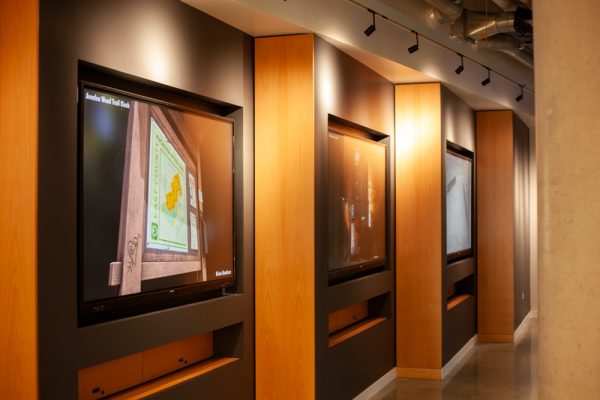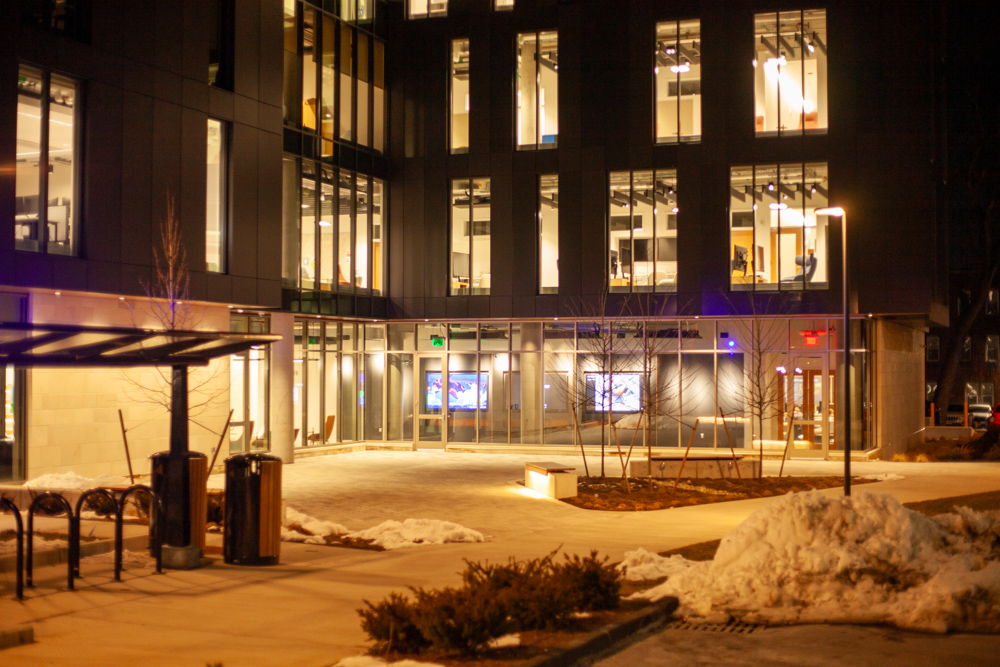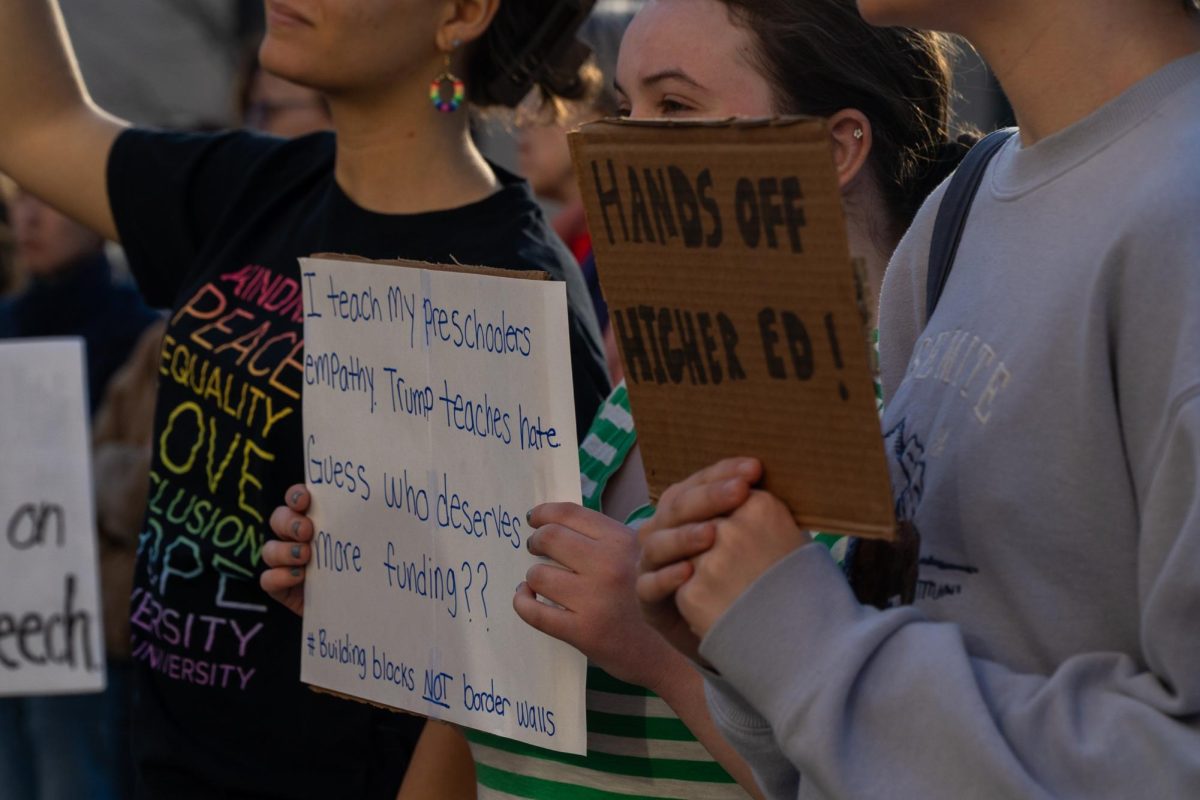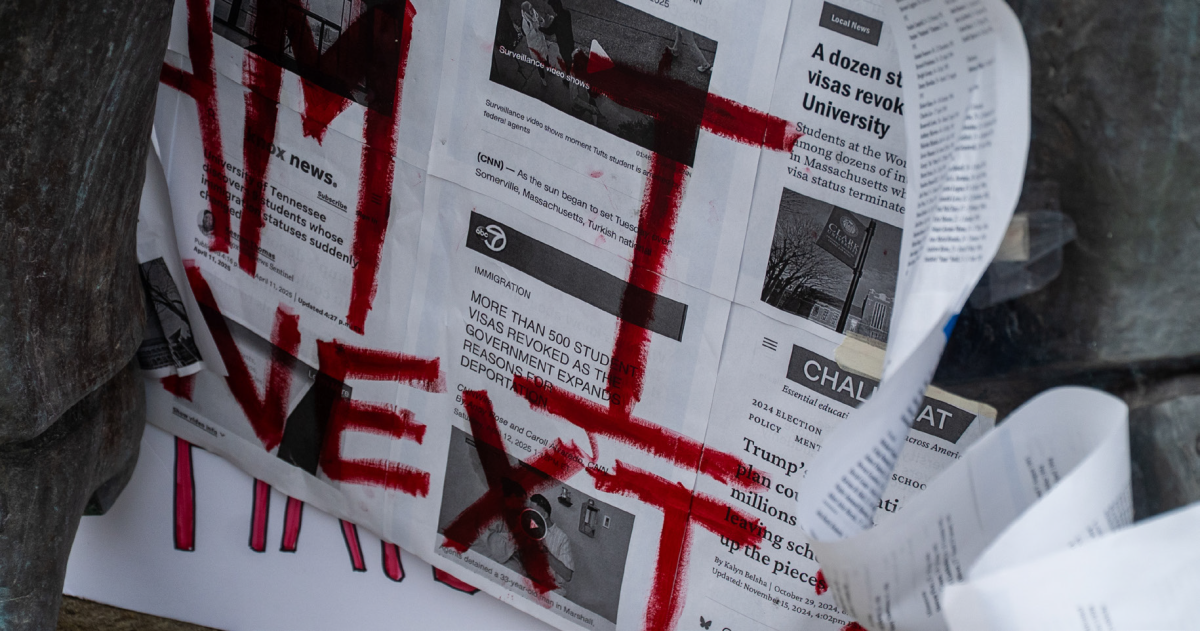After receiving disciplinary sanctions from senior administrators for writing charged messages on several university-owned digital whiteboards, a Clark undergraduate is claiming that they were singled out by the University because of their political views.
The whiteboards are located on the first floor of the Center for Media Arts, Computing and Design (CMACD). Completed last fall, CMACD is Clark’s newest building. The whiteboards can be erased with the push of a single button on the screen, deleting any writing and returning the user to a home page.
The student, who wished to remain anonymous in an interview with The Scarlet, entered CMACD on January 7 of this year. The student allegedly wore a face mask to conceal their identity. According to the student, they inscribed the following messages across three whiteboards: “CUPD is racist,” “CU admin hates mutual aid,” and “Ceasefire Now, Free Palestine.”
CUPD refers to Clark University Police Department while “CU administration” refers to university officials. “Free Palestine” refers to the Israel-Hamas war that, as of February 13, has killed over 1,200 Israelis and 24,000 Palestinians, according to the Associated Press.
The student received an initial notice of accusation on January 30 from Kamala Kiem, Associate Provost and Dean of Students.
“You are accused of writing on whiteboards in the CMACD building,” the email reads. “It appears that you may have violated… provisions of the Code of Student Conduct.”

Regarding the accusations, the student told The Scarlet that institutions such as Clark “do not listen to a polite ‘please’ or emails.” To enact meaningful change, they asserted, “you have to be disruptive.”
Specifically, the student was accused of violating Disruption and Abuse of Property provisions. The Clark University Student Code of Conduct defines disruption as “disrupting the orderly processes of the University that involve teaching, research, administration, disciplinary proceedings, or other activities.” The Student Handbook provides examples of disruption including entering private areas without authorization, and preventing those “exhibiting freedom of expression” or “academic freedom” from doing so.
Abuse of Property includes “damaging, destroying, misappropriating, misusing, or improperly accessing” campus facilities and property, according to the Handbook. The accused student accessed CMACD using their Clark student ID.
The email also noted that the student was scheduled for a 10:00 AM meeting on February 5 with Associate Dean Dr. Kamaro Abubakar. If the student chose not to attend, a decision regarding imposed sanctions would be made on their behalf and communicated to them through email.
“I had kind of prepared my little spiel because I was like, OK, let’s go down one by one of each of these accusations and how they apply, or rather do not apply, to my case,” the student said. “That’s what I thought was going to happen.”
When the student arrived at the Dean’s office, they were allegedly told by a representative that no meeting was scheduled at that time, despite it being in the student’s calendar for several weeks. The scheduling miscommunication was quickly resolved, however, and the student met with Dr. Abubakar at the originally designated time and location.
The focus of the meeting was on the content of the messages, and not so much on prohibited conduct, according to the student. For example, the student was asked if they had ever been racially profiled by a police officer and if they were a member of the See You Collective (SYC), a student-run mutual aid organization that distributes funds to Clark University students experiencing financial hardship. Dr. Abubakar also allegedly asked the student if they knew people who were involved with the organization. SYC is not affiliated with Clark University.
The student has neither been racially profiled by police officers, nor have they been involved with the SYC in an administrative position, they said. The student suggested that these questions were asked in reference to the messages they wrote regarding CUPD and administrators’ response to mutual aid, particularly the SYC. The student asserted that the University had been hostile towards the mutual aid group.
The student also claims that Dr. Abubakar said that the whiteboards in CMACD were meant to display video messages from the university officials. Upon investigation, the first-floor whiteboards in CMACD do not currently seem to be in use for this purpose.
“You’re putting a lot of weight on implication,” the student said. “And that’s not a safe thing. That’s not something that an administration of an institution does.”
By the end of the meeting, the student felt that they had been treated “like a misguided lamb who doesn’t know their way around things,” they said.
Following the meeting’s conclusion, the student received a second email imposing three sanctions. A “BASICS” interview, scheduled by the student, would need to be conducted with a representative of CUPD by February 25. The interview is intended to outline CUPD’s role on campus, and lasts roughly an hour.
Second, a disciplinary warning was issued to the student that indicates their alleged violation of the Student Code of Conduct. It will remain intact for a period determined by the student’s judicial officer. Repeated offenses committed during the period of a disciplinary warning may result in increased sanctions that “reflect” that status. The email did not indicate whether this status would be valid for the remainder of the semester or the remainder of the student’s time at Clark.
Finally, the student must send a letter of apology to Dr. Abubakar by February 26. The apology letter must be approved by Dr. Abubakar before it can be sent to the intended recipient. However, no official guidelines as to the content or length of the letter were provided, according to the student. Neither was the name of the intended recipient or recipients.
“Your actions on January 07, 2024 were certainly regrettable,” wrote Dean Abubakar. “As a student at Clark University, I hope you have learned a valuable lesson from this experience and will, in the future, make healthier decisions.”
The student told The Scarlet that they do not intend to schedule the BASICS interview or submit a letter of apology. When asked what the consequences of not completing the three sanctions were, the student could not provide a concrete answer. According to the Student Code of Conduct, compliance with all requirements set by Clark University officials is compulsory. However, no specific repercussions are noted.
The student noted that they are not as impacted by the situation as they expect most people would “reasonably be,” due to the strong showing of support from family and friends, specifically their mother, who is a recently retired attorney.
“But it was a lot to manage,” the student said. “Like, I’ve got to do my homework assignments. Then I also have to coordinate reaching out with friends, emailing professors, and writing the apology letter.”
University leaders respond to claims of vandalism
Dean Kiem and Margo Foreman, Vice President and Chief Officer of Diversity, Equity and Inclusion, addressed wider concerns on campus “dynamics” in an email to the student body sent on Wednesday, February 21.
Foreman and Kiem referenced “incidents of graffiti and postings that include hurtful language” regarding the Israel-Hamas war. They wrote that a Jewish-identifying student reported an instance of harassment in which “hateful and intimidating messages” were written on a dry-erase board in a residence hall. The email did not disclose the specific content of those messages.
The email also acknowledged that some students, “when they show support for Palestine,” feel their voices are suppressed when they are critiqued by weaponized “claims of antisemitism.”
The administrators go on to claim that many cases are “challenging to navigate” when Clark’s Office of Community Standards (OCS) cannot “identify specific students who are violating [University] policies.” They write that OCS will investigate and address any instances of “violence, harassment, discrimination, and intimidation.” According to the University website, the OCS enforces the rules and regulations outlined in the Student Handbook.
Kiem and Foreman cite the University’s “Freedom of Expression” policy to highlight the responsibilities of their respective offices. They quote a section of the policy that reads, “we must ensure that a commitment to freedom of speech is effectively sustained alongside policies that… reject violence, harassment, discrimination, and intimidation.”
The email provides links for filing bias and hate reports, guidelines for on-campus “postings,” the protest and demonstration policy, and contact information for the OCS.
“We know this is a challenging time, but Clarkies are here for one another in a way that is special and unique,” the email concludes. “Let’s lean into that strength of community and be a place where all feel welcome and enjoy a sense of belonging.”
February 25, 2024 Update: Visiting Professor John Freyermuth Speaks on Use of Digital Whiteboards
To further understand the purpose of and technology behind the digital whiteboards in the Center for Media Arts, Computing, and Design (CMACD), two representatives of The Scarlet spoke with Visiting Associate Professor John Freyermuth.
Freyermuth has spoken to the student facing sanctions for writing on the whiteboards. He calls this person a “model student” and expressed confusion as to why Clark’s administration would discipline them, given their academic and disciplinary standing. Freyermuth said he has written to administrators defending the student.
During the construction process for CMACD, Freyermuth collaborated with the building’s designers to “retrofit, redesign, and rebuild” parts of the facility. He teaches in rooms 003, 005, 016, 017, and 018 of CMACD.
According to Freyermuth, the digital whiteboards were originally designed to display art made by undergraduate students including video games, films, and other media. Faculty artwork would also be shown. However, Freyermuth says that as of February 22, he has only seen faculty artwork being displayed.
“I’ve also been involved in meetings leading up to the design and construction of the building as well,” Freyermuth said. “And from my understanding, throughout all of those conversations, they were intended to display public art that represents the spirit of…Clark’s mission statement, which is to challenge convention and change the world.”
Freyermuth argued that the artwork in CMACD should represent the school’s motto, which he says is already “instilled in a number of Clark courses and across the curriculum.”
He says that he has yet to encounter any signage detailing the white boards’ intended purpose.
“I’ve never spoken to a single student about that, and I’m not even sure if all the faculty in the building are aware of that…I do not believe there is any clear documentation, nor do I believe there is a policy that has been circulated campus-wide regarding that.”
A smart pen is provided for visitors to write on the whiteboards. To delete any written material, the user can hit a button that reads “menu,” directing them to a settings page from which they can click a “delete” button that erases all written material from the board.
The pens are designed by NEC, which is affiliated with the Smart Board company. They are styli “like you’d use at the bank to sign for something,” Freyermuth explains. “And they’re relatively easy to delete, very similar to the annotations feature in Zoom.”
In the fall 2023 semester, there was a case of a student drawing “phallic artwork” on the digital whiteboards in CMACD. Freyermuth asserts that there were several meetings regarding how administrators could “remove all ability” to write on the white boards.
“But that conversation died on the vine,” Freyermuth said. He noted that he had never seen a student write on the CMACD whiteboards.
Freyermuth said that the student was never identified and did not receive sanctions, unlike the anonymous student in early February.
Everett Beals, Morgan Martin, Ava Orofino and Nic Smith contributed to this story.




Lily Brown ~ Feb 26, 2024 at 11:23 am
FREYERMUTH MENTIONED!!!!